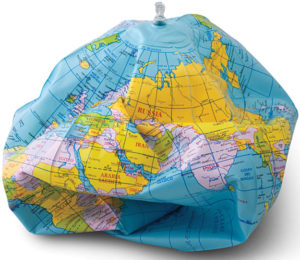By Liban Ahmad
Four years ago Somalis in the homeland and in the Diaspora were looking forward to a change of government and the end of the transitional government in Somalia. What the Somali Federal Government, the successor to the former Transitional Federal Government, has so far achieved by reluctantly or partially facilitating formation of federal states is not as noteworthy as the monumental failure to reduce dependency on AMISOM and create nation-wide security forces, an inclusive army and pave the way for one-person-one-vote elections in 2016.
 According to Michael Keating, the Special Representative of the Secretary-General of United Nations for Somalia, “the population has low expectations of and little faith in government. In many areas, Al Shabaab is more effective in providing security and rule of law – albeit their own brutal version – than government.” Keating’s predecessor, Nicholas Kay, argued that “Somalia”.
According to Michael Keating, the Special Representative of the Secretary-General of United Nations for Somalia, “the population has low expectations of and little faith in government. In many areas, Al Shabaab is more effective in providing security and rule of law – albeit their own brutal version – than government.” Keating’s predecessor, Nicholas Kay, argued that “Somalia”.
As Sir Professor Paul Collier of Oxford University’s Blavatnik School of Government has argued recently “fragile states are the epicenter of human tragedy“, where people lead miserable lives in an environment in which they are not safe. A fragile state “is a nightmare for others.” Is the Somali Federal Government to blame for not holding one person, one vote elections? In a fragile state “elections do not work and power does not turn into legitimate authority”, says Professor Collier.
Responding to challenges thrown up by a fragile statehood is beyond the capacity of the Somali government, and this explains why AMISOM is in Somalia, why Somalia’s friends commit more funds to African peacekeeping mission in Somalia and why Britain “stepped in to make up some of the difference in the short term” after “AMISOM’s funding quota was slashed to 80 percent in February.”
The collapse of the state in 1991 caused parts of Somalia that were previously characterized as a periphery to begin to rely on their human capital and create institutions. Before 1991 inhabitants of periphery regions experienced the impact of under-investment in public services and education by a central government that viewed the capital and nearby regions as the primary focus of the national development plans. Regions that previously benefited from proximity to the seat of the government have suffered most after state collapse, and are now relying on AMISOM to create local institutions.
The persistent political problem of Somali politicians wielding power without authority at the national level was first raised in Mogadishu in 1991 shortly after the United Somali Congress had overthrown the military regime. In a meeting organized by USC intellectuals held in February 1991, Professor Mohamud Turyare cautions against forming of a government without wide consultations with armed opposition movements particularly the former Somali National Movement. Decisions made by a USC-installed government will not take effect in other regions, Professor Tuuryare said. “An ineffectual government should not polarise people. Our security depends on forming of an inclusive government.”
The Lafaweyne Hotel meeting underscores the significance of not leaving politics–defined by Professor David Held as the “discourse and struggle over the organisation of human possibilities“–to politicians whose decisions – dissolution of the Somali Army and reluctance to respond to anarchy in the capital – had plunged Somalia deeper into anarchy. Some of the questions raised by participants in a series of meetings at Lafawayne Hotel are as relevant today as they were in 1991: why should a mono-clan armed group (USC in this case) embark on attacking other regions after USC dissolved the Somali Army?
In another session Abdullahi Jama, a federal parliament MP who was killed in Al-shabaab suicide bombing this year, alerts participants to a new trend in 1991 Mogadishu: instead of working together to restore law and order to deter potential criminals people were blaming clans and sub-clans for what looters and robbers had done . He unequivocally made a strong case for the need for a state with monopoly on violence when he said: “anarchy by a clan cannot be dealt with by another clan.”
If Somali politicians continue to fail to create institutions with which people can associate the impersonal nature of the state, dependency on AMISOM will continue to deal with what Professor Collier describes as “spillovers” from a fragile state. One major lesson from the former, failed state status of Somalia is that a fragile state has almost all major characteristics of a failed state. Only when the international community put time and resources into helping Somali political classes to work together to minimize threats from forces allied with the transnational terrorism has it become clear that building state institutions for a country that experienced state failure requires genuine political commitment. Benefits of rebranding or upgrading do not seem to be trickling down to regions ruled by feuding clan militias. That is why Somalia’s ‘fragile state’ status is not a cause for celebration.
Liban Ahmad
Email: [email protected]
See below youtube videos
— Paul Collier: Growth Challenges in Fragile States
– Anarchy by a clan cannot be dealt with by another clan.”
We welcome the submission of all articles for possible publication on WardheerNews.com. WardheerNews will only consider articles sent exclusively. Please email your article today . Opinions expressed in this article are those of the author and do not necessarily reflect the views of WardheerNews.
WardheerNew’s tolerance platform is engaging with diversity of opinion, political ideology and self-expression. Tolerance is a necessary ingredient for creativity and civility.Tolerance fuels tenacity and audacity.
WardheerNews waxay tixgelin gaara siinaysaa maqaaladaha sida gaarka ah loogu soo diro ee aan lagu daabicin goobo kale. Maqaalkani wuxuu ka turjumayaa aragtida Qoraaga loomana fasiran karo tan WardheerNews.
Copyright © 2024 WardheerNews, All rights reserved


